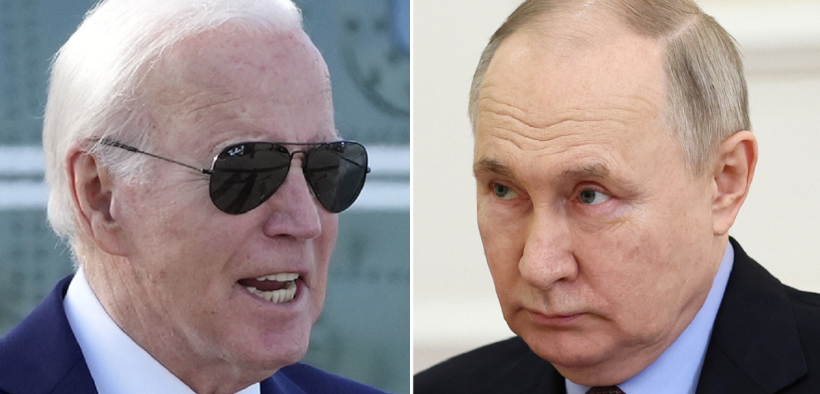‘Crazy SOB’ Putin does indeed prefer Biden as president. Here’s why
Share

On Feb. 21, during a fundraiser in San Francisco, President Biden called Russian President Vladimir Putin a “crazy SOB,” lamenting that “we always have to worry about nuclear conflict, but the existential threat to humanity is climate.”
The next day, asked by a Russian state TV reporter for his reaction to Biden’s “nasty” words, Putin called them “absolutely adequate,” suggesting the outburst was prompted by Putin’s earlier statement expressing his preference for Biden as a future U.S. leader, rather than Donald Trump.
“Judging by what he has just said,” continued Putin, “I was absolutely right because it’s an adequate reaction to my remark.” Speaking about “what’s best for us, Russia,” Putin, wearing a sarcastic smile, doubled down, “I’ve said it once and can repeat: Biden.”
Normally, Putin cannot be trusted. A former KGB operative, Putin is highly skilled at deception, the intelligence tradecraft that he regularly employed when he recruited spies in Eastern Germany. As a former Defense Intelligence Agency officer, I spent my career studying and analyzing Putin and his thinking. I am here to tell you that in this case, we can take Putin at his word – he does indeed prefer Joe Biden over Donald Trump as his U.S. counterpart. Here’s why:
Putin has sized up the U.S. president and likely concluded that Biden is naïve, can be easily manipulated, lacks a well-rounded background, and is not a strategic thinker. Saying nothing about the Kremlin’s acute awareness of the U.S. commander in chief’s obvious cognitive and physical decline.
An avid judo practitioner, Putin uses the key principles of this martial art against his opponents on the world stage. “Judo teaches you to maintain control, to feel the sharpness of the moment, to see the strong and the weak sides of your opponent, to strive for the best outcome.” Thus Putin is always on the lookout for the opportunity to knock his opponent off balance. Biden has proven vulnerable to Putin’s influence.
Putin thinks he can disorient Biden and shape his decision-making in a way that is beneficial to Russia, rather than the U.S. Biden is easily flustered by Putin’s actions, having called him a “killer,” “murderous dictator,” “war criminal,” “butcher,” “pure thug,” and the like. Putin perceives Biden’s losing his cool as a sign of helplessness. Putin knows he can get to Biden.
Biden’s hatred of Putin prevents him from learning who his opponent is, enabling Putin to constantly outmaneuver him. As an architect of the Russia “reset” strategy in the Obama administration, Vice President Biden was promoting friendship between the two nations at the very same time when Putin was preparing to invade Ukraine. Moreover, Russia was developing a warfighting strategy against the U.S. that included cyberattacks on critical infrastructure, destruction of our satellites, disruption of undersea internet cables, and other nasty things. This was Putin’s way of keeping the U.S. military out of the battlefield in Ukraine. Biden almost certainly was briefed on that intelligence.
Remarkably, during their summit in Geneva, Biden handed Putin a list of 16 U.S. sectors of critical infrastructure that he did not want Russia to attack with cyberattacks, as though Putin would alter his policies just because Biden wanted him to. In the run-up to Russia’s invasion of Ukraine, Biden announced that he would not authorize the deployment of U.S. forces into the theater, suggesting that a “minor incursion” was acceptable.
While Putin is an attorney with a Ph.D. in economics, Biden does not understand economics and its relationship with geopolitics. Consequently, Biden’s sanctions policy helped finance Putin’s war on Ukraine while backfiring as Biden’s cancellation of the Keystone XL pipeline prompted the global supply of oil to drop and Russian oil imports to spike, resulting in the increase of Russia’s defense budget 1.5 times.
This also increased our dependency on Russian oil. In 2022, the United States was buying oil from Russia as Russian forces were devastating Ukraine. To this day, gasoline prices remain high, pushing up transportation costs, and therefore prices on food and goods, and across various other sectors of the economy, which have been suffering from high inflation.
Meanwhile, Biden’s sanctions on Russia had the opposite effect from what he expected. Putin knew that Biden would deploy sanctions. He, therefore, began sanction-proofing the Russian economy and transitioning it to a wartime footing, well in advance. In 2015, seven years prior to the 2022 invasion, Putin declared the so-called “special period,” a legal regime that allows the Russian state to mandate that factories switch production from civilian goods to military hardware, such as missiles, drones and tanks.
In addition, Putin mandated an import substitution program across the Russian manufacturing industry, spurring indigenous production in Russia and decreasing dependence on Western goods and components. He largely de-dollarized Russia’s Sovereign Wealth Fund, in favor of the Chinese yuan, the euro and gold, and beefed up Russia’s foreign exchange reserves to an all-time high.
Contrary to Biden’s expectations of Russia’s collapse, the Russian economy is doing well and is even edging ahead of Germany, according to the World Bank’s ranking of GDP by purchasing power parity. The International Monetary Fund updated its growth forecast for Russia to 2.6% in 2024, a 1.5% point rise over what it had predicted last October, according to the Financial Times.
President Biden lacks a strategic grasp of how the world works, undermining the U.S. position in the global economy. (AP/Alex Brandon)
Biden lacks a strategic grasp of how the world works, undermining the U.S. position in the global economy with his policies. Biden’s weaponization of the dollar by sanctioning nations that don’t share Washington’s worldview has resulted in the trend of de-dollarization of the world economy.
In addition to Russia, many other countries have begun de-dollarizing their economies out of fear that they will be the target of Washington’s ire. The BRICS alliance, which includes Russia, China, Saudi Arabia and Iran, among others, is working to establish a new currency, similar to the euro, to reduce its reliance on the dollar.
Lower demand for the dollar will result in higher interest rates and inflation, would harm the stock market, and make borrowing to finance our massive federal deficit far more difficult. These policies will have a catastrophic effect on the United States, benefiting Russia.












